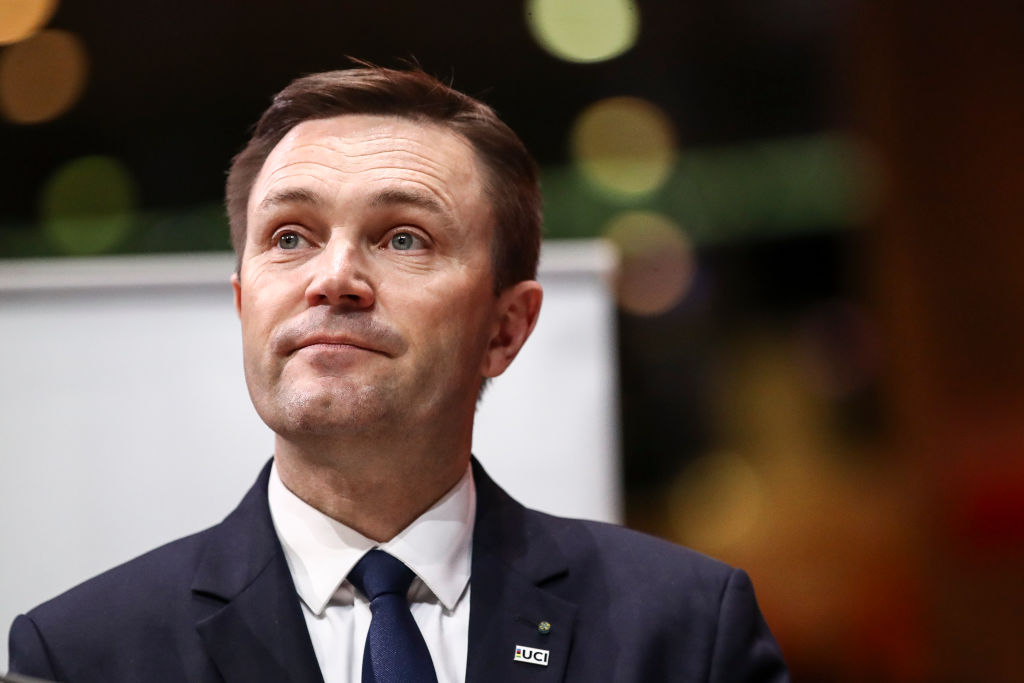Lappartient: UCI is not naive when it comes to doping
UCI president on ITA partnership, testing, intelligence, ketones, and funding

UCI president David Lappartient acknowledged that the recent paucity of positive doping tests is not necessarily cause for celebration, as the sport’s governing body outlined its new approach to combatting cheating.
At the start of last year the UCI handed the task of policing the sport from the Cycling Anti-Doping Foundation, which it set up itself in 2008, over to the International Testing Agency (ITA), an organisation that already performs a similar function for a host of international sporting federations.
Question marks were raised over the decision and whether the ITA could adequately handle the demands and intricacies of the cycling anti-doping programme. This week the two organisations held an event to discuss progress and future challenges, with both parties naturally declaring the partnership a success.
After an alarming pandemic-induced drop-off, testing levels have returned to somewhere approaching the levels carried out by the CADF in 2019. However, there has been a drop in the number of positive tests, with nine in total but only two of them from fully professional riders and none from the WorldTour.
“If we don’t have positive results, that’s some good news for the UCI. However, we’re not so naive to believe there’s no more doping,” Lappartient said.
The Frenchman expressed a belief that “education” was responsible for what he described as “a new philosophy” in the pro peloton, pointing out that many of today’s younger generation were born in the wake of past scandals and “grew up with the fight against doping in their blood”.
However, he acknowledged the threat of doping hadn’t gone away.
The latest race content, interviews, features, reviews and expert buying guides, direct to your inbox!
“We always have to be awake in the fight against doping. It’s something that can really come back if you slow down the efforts,” he said. “We know [doping] can happen and will probably continue to happen, but what we want to give as a message for the cheaters, is we want them to be sure that we will catch them.”
In slight contrast, Lappartient later stated: “The goal for us is not to catch cheaters; it’s to prevent cheaters from cheating.”
In that respect, it was acknowledged that testing is not the be-all and end-all, explaining that part of the ITA’s remit was to improve intelligence-led investigations. UCI Director General Amina Lanaya said the UCI had given “carte blanche” to the ITA in that respect, while Lappartient explained that such operations were a key part of the switch from the CADF.
“To do this only at the CADF level was not the good scale. Why? Because most of the problems in doping are not only contained in one sport, they are networks operating across different sports, and that’s why intelligence should be among the disciplines.”
The ITA would not comment on whether its efforts had so far produced any results but claimed that information they'd received through their whistleblowing platform had contributed to investigative efforts.
Improving storage capabilities in order to reanalyse samples up to 10 years after collection, should new scientific methods come to light, was also identified as “a strong part” of the new ITA programme and the wider “dissuasive effect”.
Meanwhile, Lappartient used the recent controversy surrounding tennis French Open champion Rafael Nadal’s foot injections to boast that cycling’s rules were far stricter than other sports. He highlighted the ban on tramadol and the lobbying of the World Anti-Doping Agency over corticoids as feathers in his own cap, while also pointing out the bespoke study the UCI is carrying out on ketones, which he said will not be complete until the second half of 2023.
“We are very attentive to new [doping] substances and methods. When we become aware of something, we act,” Lappartient insisted.
“In terms of credibility in the fight against doping, what you lose in five minutes you only regain in 20 years. Although we’ve done an enormous amount and regained credibility, we will not compromise now.”
That said, he did suggest that the anti-doping programme is currently under-funded.
“It is priceless but the cost to us is around 8million Swiss Frances, and it will probably have to be more in the future. There are conversations with stakeholders to increase the contribution by 20-25%.”
Patrick is a freelance sports writer and editor. He’s an NCTJ-accredited journalist with a bachelor’s degree in modern languages (French and Spanish). Patrick worked full-time at Cyclingnews for eight years between 2015 and 2023, latterly as Deputy Editor.
